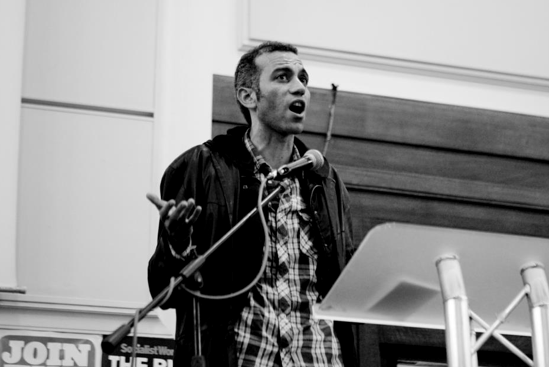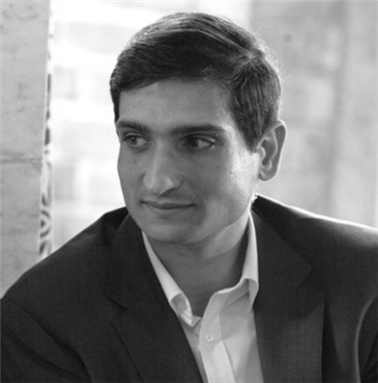[This post is part of an ongoing Profile of a Contemporary Conduit series on Jadaliyya that seeks to highlight distinct voices primarily in and from the Middle East and North Africa.]
Jadaliyya (J): What do you think are the most gratifying aspects of Tweeting, and Twitter?
Hossam El-Hamalawy (HH): The ability to deliver news updates about dissent to a large audience of people and media organizations instantly.
J: What are some of the political/social/cultural limits you’ve encountered using the platform?
HH: You are only limited to 140 characters, which leaves you little room to go into details of an issue for sure, hence I believe Twitter is better mainly for breaking news and short updates. But another platform would be necessary to explore the subjects tweeted in details. Also, you are always faced with a challenge to verify the information circulating in your timeline and the Twittersphere in general. Twitter is a medium where rumors can go viral easily.
J: In your experience and use of Twitter, do you feel it helps mobilize or disorganize? Focus or crowd? Is it manageable or noisy? Can it help persuade and mobilize, or does it turn everyone into a voyeur and spectator?
HH: Twitter helped spread the word in so many situations about actions on the ground and helped attract more audience to it. And there were cases where the call for protests came from Twitter and did materialize eventually on the ground.
But also on occasions, I saw Twitter helping to exaggerate the power and strength of some activists and/or groups giving a false impression about their abilities. There were numerous calls for protests and general strikes on Twitter (and on Facebook), which yielded nothing in the end. Some are under the illusion that it’s enough to have a Twitter account with big number of followers to “instigate the masses into action,” which is of course a farce.

[Image of Hossam El-Hamalawy.]
J: Do you see Muhammad Mursi`s election as hindering the demands of revolutionary socialists, and if so, what course of action do you think is necessary?
HH: While Mursi is not a revolutionary candidate, Shafiq’s election would have been catastrophic, demoralizing for a large section of the population, and a triumph for the counterrevolution. Mursi cannot and will not fulfill the demands of the revolution. He is part of the opportunistic leadership of the Muslim Brotherhood who seek reforming the current regime with cosmetic changes and compromises with the military junta. The latter are being provided a safe exit. But with every compromise Mursi and the Brothers make, they are providing an opportunity for the revolutionary left to intervene, build roots, and win a new ground. The labor strikes that are flaring now are a fertile soil where we can build a new alternative to both the military and the Islamists.
J: You describe the significance of pro-Palestinian demonstrations prior to the revolutionary demonstrations which toppled the Mubarak regime. What hopes do you have for changing Egyptian policy on Palestine, and what do you believe is the best course of action for Egyptian revolutionaries and activists on that front?
HH: I firmly believe that the road to Jerusalem passes through Cairo and the Arab capitals. I want to see no less than the liberation of Palestine from the river to the sea. A revolutionary Egypt must open the Rafah crossing permanently, scrap the Camp David agreement with the Zionist state, expel the Israeli ambassador, and lend its complete support to the Palestinian resistance. But the Camp David regime has not fallen up till now, even when Mubarak is gone and we have a Muslim Brotherhood president. The latter is still more than happy to court US imperialism and accommodate to Israel’s security. The Palestinians continue to be demonized in the state-run and private press. We haven’t seen any major change yet in Egypt’s official policy towards the Palestinians.
J: Over a year after the beginning of the Egyptian revolution, what prospects and obstacles do you believe lie ahead for the Egyptian labor movement?
HH: The answer is simple. The Egyptian labor movement is still in need of an organization.
[Hossam El Hamalawy tweets at @3arabawy and blogs at 3arabawy.]
![[Image of Hossam El-Hamalawy.]](https://kms.jadaliyya.com/Images/357x383xo/ScreenShot2012-10-19at2.47.37PM.png)

















